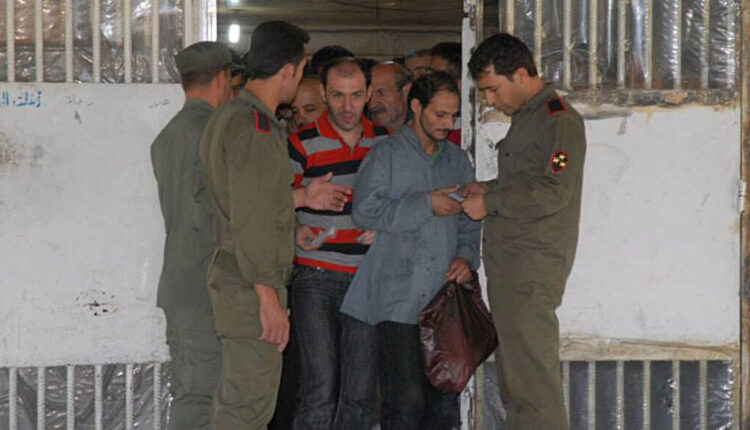ALEPPO, Syria (North Press) – Family of the 35-year-old Ahmad Kaseho, from the neighborhood of Ba’idin, east of Aleppo Governorate, northern Syria, searched for their son who went missing on a checkpoint of government forces in the Syrian coast, using various means.
In October 2013, after Syrian opposition factions took control of the area, Kaseho went out with his wife and two children, 7-year-old Mustafa and 5-year-old Halima to the Syrian coast, fleeing bombardment.
When they reached the entrance of the Syrian coastal governorate of Tartus, he was arrested on a checkpoint and no one has known anything about him till now.
40-year-old Raja’ Kaseho, Ahmad’s sister, told North Press details of the “tragedy,” as she put it, when her brother’s wife and children came back to Aleppo without her brother.
She said, “suddenly, the door was knocked, it was my brother’s wife and his two children, crying out of what happened to them, as my brother was arrested.”
“His wife, Asmaa, tried to know where they would take him and why, but she did not get an answer,” Raja’ added.
Searching Journey
The sister said that she carried out a searching journey during which she faced a lot of troubles.
She said, “I arrived in Tartus and went to security branches and the branch of Arab Socialist Ba’ath Party, and I got information that popular committees (Shabiha), affiliated with National Defense Forces, operated at that checkpoint were responsible for my brother’s enforced disappearance.”
She went further, saying, “They told me that he was transported to Damascus without telling me in which prison he was or what were the charges against him.”
Before losing hope of finding Ahmad, his sister went to Damascus and contacted with officials of the prisons of Saydnaya and Adra, but she did not get any information about him.
Kaseho family had not worked for any government supporter parties or opposition factions since the opposition factions took control of the neighborhood in late 2012, as it used to sell diesel in winter and vegetables in summer.
Raja’ described the family’s situation after losing Ahmad, who is a son, a father, a brother and a husband, saying, “His two children are still crying whenever we talk about him, and his 55-year-old mother died after he went missing, as she had hypertension and diabetes.”
Partial general amnesty
On April 30, Syrian President Bashar al-Assad issued a legislative decree, offering general amnesty for terrorist crimes committed by Syrians before April 30, 2022, for the first time since the beginning of protests in Syria in 2011, according to the state-run SANA News Agency.
According to reports, the amnesty included only dozens of detainees from some governorates, while lots of families, who were waiting for their sons, were disappointed and the destiny of others has been still unknown.
On September 21, DW said that the United Nations (UN) was to establish an international mechanism to look for over 100.000 Syrians who have gone missing during Syrian civil war.
Statistics
At the beginning of 2022, 840 tables, each one of them included 25 names of those who have gone missing, arrived to the office of the missing persons in Aleppo, according to Ahmad Mustafa, a pseudonym for an official in the office.
Mustafa told North Press that the office of the missing persons recorded about 21.000 cases, 60%percent of them are for men, 30% are for women, and 10% are for children from the city and the countryside.
Still the recorded numbers are little in comparison with the real ones that have not been documented by any human rights organizations.
In September 2014, the father of the 30-year-old Ibrahim Basmaji, a resident from Sayf al-Dawla neighborhood in Aleppo, went missing on his way to Tartus.
The father was driving a Suzuki carry, heading towards the Syrian coast, to sell automotive parts that he bought from the suburb of Ramouse.
Basmaji phoned his father, who was on his way, and asked him to come back due to the spread of the phenomenon of kidnapping in the countryside of Hama and Homs, however, the father refused, saying, “I will not come back, I am about to arrive.”
After five hours, the son re-phoned his father but he did not answer him.
As the son was calling his father, one of the kidnappers answered him and asked him for a ransom of three millions SYP.
After arguing with the kidnapers, who threatened to kill the father, Basmaji agreed with them to pay one million in the area of al-Mecherfe, in the countryside of Hama.
Basmaji put the money in the location that the kidnapers mentioned and he stayed waiting for his father for two days in the city of Salamiyah, according to the agreement, but in vain.
On September 23, Paulo Pinheiro, Chair of the Independent International Commission of Inquiry on Syria, focused of the issue of the missing persons saying, their fate and whereabouts must be clarified.
The Secretary-General’s urgent report on this issue contained a clear recommendation for the establishment of an international body, as called for by families and survivors, focusing strongly on victims and survivors and inclusive of families as soon as possible.
This came in an interactive dialogue held by the UN Human Rights Council with the Commission in the Swiss city of Geneva.
A 2021 UN report titled “Report of the Independent International Commission of Inquiry on Syria” estimates that 100.000 persons are missing because of the current conflict in Syria.

